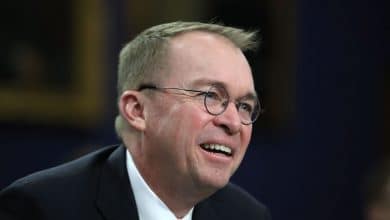MedicareRepublicansSocial Security
Democrats Should Respond To Trump’s Healthcare Defeat By Expanding Medicare

In the wake of the collapse of Trumpcare, Democrats should not simply move on. Rather, they should propose the expansion of Medicare as a way to improve the Affordable Care Act (“ACA”). Expanding Medicare, like expanding Social Security, is excellent policy. It is also extremely popular, not only with the Democratic base, but the Republican base, as well.
As a Party, Democrats should propose the elimination of the so-called age tax, by lowering the initial age of eligibility for Medicare from age 65 to age 50. The age tax is the practice of insurance companies charging Americans aged 50 and older much more, simply as a result of age.
Lowering the Medicare age to 50 makes private individual health insurance more affordable, because it removes those who, on average, cost the most to insure. In addition to reducing the cost of private health insurance and eliminating the so-called age tax, the change would lower Medicare’s per capita costs, as well.
Medicare currently covers people from age 65 to 114, the age of the oldest American alive today. It also covers about 9.5 million people with disabilities. Seniors and people with disabilities are the part of the population with the highest average medical expenditures. Consequently, lowering the Medicare initial eligibility age to 50 brings in those with lower medical costs, on average, and so, reduces Medicare’s average costs.
Reduced average costs of private health insurance and Medicare! That is a winning combination. Unlike Trumpcare, which increased the age tax, this proposal would eliminate it.
Even if there is resistance from die-hard ideologues to lowering the Medicare eligibility age to 50, they should certainly support lowering it to age 62, when Americans can first claim Social Security. Over 2.8 million Social Security beneficiaries are under the age of 65, even though claiming early means that those beneficiaries will have smaller monthly benefits for the rest of their lives. Many, and perhaps most, have no other choice. Some have lost their jobs and have no other income. Others worked in physically demanding jobs, where their bodies wore out. Still others must stop work to care for a sick spouse or parent. Indeed, the most common age to claim Social Security’s earned benefits is age 62.
These younger retirees are often hanging on as well as they can, until they turn age 65 and can begin to be covered under Medicare. Much was made, in the Trumpcare debate, about the Congressional Budget Office finding that 64-year-olds with annual incomes of $26,500 would have paid $14,600 — more than half their incomes — in annual premiums under Trumpcare.
Half your income on health insurance premiums is unaffordable. It is nearly nine times more than the $1700 annual premium they currently pay under the ACA.
What was left unsaid, though, is that those 64-year-olds pay considerably more for their health insurance under the ACA than the vast majority of the 55 million Medicare beneficiaries pay for their health insurance. In fact, those 64-year-olds pay considerably more for their health insurance than the vast majority of those nearly 2 million Americans older than age 90 pay for their Medicare! More than the 35 or so beneficiaries over 110 pay for Medicare!
In 2017, the vast majority of those receiving Social Security and Medicare will pay just three-quarters of what 64-year-olds pay under the ACA — at most, $1308 for Medicare versus $1700 under the ACA (versus $14,600 under Trumpcare)! (Those who are covered by Medicaid, as well as Medicare, pay nothing. Those who are of higher income, pay more.)
In addition to ending the age tax and lowering costs, expanding Medicare can cure other shortcomings of the ACA. There are complaints that not all of the health insurance exchanges offer choice, since private health insurance companies have the option not to participate. To solve that, Democrats should propose that Medicare be offered as an option on the exchange. That would bring in even younger people, again likely making Medicare’s per capita costs lower. Even those with pre-existing conditions may be no more expensive — and may be considerably less expensive — than those who are covered by Medicare
Why can Medicare offer such a good deal? Even without adding those younger, healthier individuals, Medicare has lower per capita administrative costs than private health insurance. Despite the fact that Medicare covers those in the population with the highest health care needs, it is far more efficient than its private sector counterparts. In 2015, administrative expenses accounted for just 1.4 percent of all Medicare expenditures — compared to private insurers’ combined administrative expenses and profits that can eat up 20 percent of customers’ premium payments.
Unlike private health insurance, Medicare does not employ an exorbitantly-paid CEO and seeks simply to cover its costs, without running a profit. It has efficiencies of scale that come with covering 55 million people. There is a reason that other industrialized countries cover all their citizens at a fraction of the cost and deliver better health outcomes. They have in place what is essentially Medicare for All.
The good news is that leading Democrats are talking about expanding Medicare. Senate Democratic Leader Chuck Schumer (D-NY), in a Friday night interview responding to the Trumpcare collapse, suggested “providing Medicare maybe for more people,” and “more competition through a public option.”
Senator Bernie Sanders (I-VT) ran for President on a platform of Medicare for All. In an interview he gave on Friday night, he advocated moving “forward toward a Medicare-for-all single-payer program.”
In response to the defeat of Trumpcare, Senator Jeff Merkley (D-OR) said, “There are plenty of ideas already on the table that would make health care more affordable for working families, from a public option, to prescription drug negotiations, to offering older Americans the chance to buy into Medicare.”
Representative Keith Ellison, co-chair of the Congressional Progressive Caucus and Deputy Chair of the Democratic National Committee, said on Thursday, even before the defeat of Trumpcare, “Don’t just be satisfied with defeating Trumpcare ― set your sights on creating real Medicare for all!”
Expanding Medicare is winning policy and politics. A recent Gallup poll reveals that 58 percent of Americans favor “Replacing the ACA with a federally funded healthcare program providing insurance for all Americans.” That is a higher percentage than those who want to repeal the ACA (51 percent) or want to keep it (48 percent).
In an attempt at face-saving, Donald Trump asserted, “What would be really good is if the Democrats, when [the ACA] explodes, which it will soon, is if they got together with us and if we got a real healthcare bill. I’d be totally open to it.”
Leaders Schumer and Pelosi, and all your elected colleagues: Obviously, the ACA will not “explode.” Nevertheless, the Democratic Party should call Trump’s bluff. The opening he has given you is larger than the big rig he was photographed in on the White House lawn. When he and his fellow Republicans see how popular expanding Medicare is, they will think that the photo-op rig ran them over.
Medicare was intended as simply a first step on the way to covering everyone. Now is the perfect time to propose, as a Party, building on its proven success and popularity.







